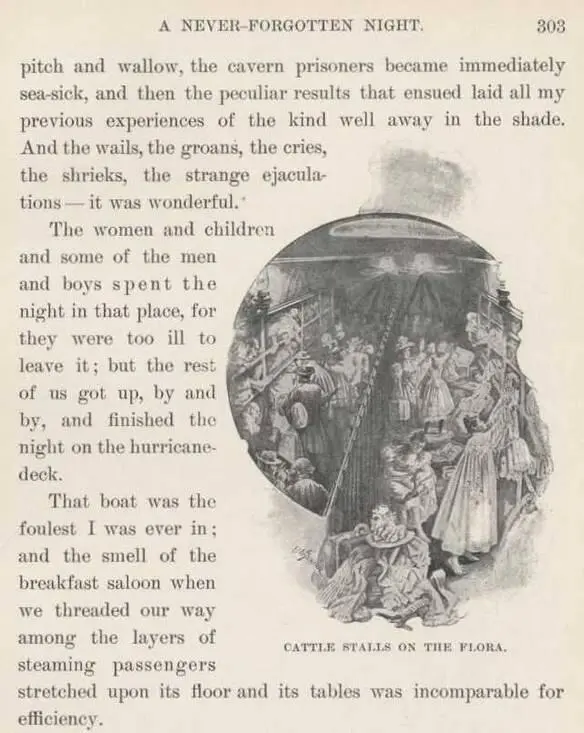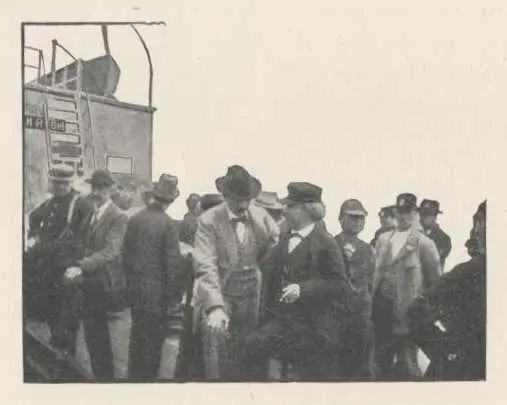Mark Twain - Following the Equator
Здесь есть возможность читать онлайн «Mark Twain - Following the Equator» весь текст электронной книги совершенно бесплатно (целиком полную версию без сокращений). В некоторых случаях можно слушать аудио, скачать через торрент в формате fb2 и присутствует краткое содержание. Год выпуска: 2004, Жанр: Классическая проза, Юмористическая проза, на английском языке. Описание произведения, (предисловие) а так же отзывы посетителей доступны на портале библиотеки ЛибКат.
- Название:Following the Equator
- Автор:
- Жанр:
- Год:2004
- ISBN:нет данных
- Рейтинг книги:3 / 5. Голосов: 1
-
Избранное:Добавить в избранное
- Отзывы:
-
Ваша оценка:
- 60
- 1
- 2
- 3
- 4
- 5
Following the Equator: краткое содержание, описание и аннотация
Предлагаем к чтению аннотацию, описание, краткое содержание или предисловие (зависит от того, что написал сам автор книги «Following the Equator»). Если вы не нашли необходимую информацию о книге — напишите в комментариях, мы постараемся отыскать её.
Following the Equator — читать онлайн бесплатно полную книгу (весь текст) целиком
Ниже представлен текст книги, разбитый по страницам. Система сохранения места последней прочитанной страницы, позволяет с удобством читать онлайн бесплатно книгу «Following the Equator», без необходимости каждый раз заново искать на чём Вы остановились. Поставьте закладку, и сможете в любой момент перейти на страницу, на которой закончили чтение.
Интервал:
Закладка:
"A feature of the election was the orderliness and sobriety of the people. Women were in no way molested."
At home, a standing argument against woman suffrage has always been that women could not go to the polls without being insulted. The arguments against woman suffrage have always taken the easy form of prophecy. The prophets have been prophesying ever since the woman's rights movement began in 1848—and in forty-seven years they have never scored a hit.
Men ought to begin to feel a sort of respect for their mothers and wives and sisters by this time. The women deserve a change of attitude like that, for they have wrought well. In forty-seven years they have swept an imposingly large number of unfair laws from the statute books of America. In that brief time these serfs have set themselves free—essentially. Men could not have done so much for themselves in that time without bloodshed—at least they never have; and that is argument that they didn't know how. The women have accomplished a peaceful revolution, and a very beneficent one; and yet that has not convinced the average man that they are intelligent, and have courage and energy and perseverance and fortitude. It takes much to convince the average man of anything; and perhaps nothing can ever make him realize that he is the average woman's inferior—yet in several important details the evidence seems to show that that is what he is. Man has ruled the human race from the beginning—but he should remember that up to the middle of the present century it was a dull world, and ignorant and stupid; but it is not such a dull world now, and is growing less and less dull all the time. This is woman's opportunity—she has had none before. I wonder where man will be in another forty-seven years?
In the New Zealand law occurs this: "The word person wherever it occurs throughout the Act includes woman."
That is promotion, you see. By that enlargement of the word, the matron with the garnered wisdom and experience of fifty years becomes at one jump the political equal of her callow kid of twenty-one. The white population of the colony is 626,000, the Maori population is 42,000. The whites elect seventy members of the House of Representatives, the Maoris four. The Maori women vote for their four members.
November 16. After four pleasant days in Christchurch, we are to leave at midnight to-night. Mr. Kinsey gave me an ornithorhynchus, and I am taming it.
Sunday, 17th. Sailed last night in the Flora, from Lyttelton.
So we did. I remember it yet. The people who sailed in the Flora that night may forget some other things if they live a good while, but they will not live long enough to forget that. The Flora is about the equivalent of a cattle-scow; but when the Union Company find it inconvenient to keep a contract and lucrative to break it, they smuggle her into passenger service, and "keep the change."
They give no notice of their projected depredation; you innocently buy tickets for the advertised passenger boat, and when you get down to Lyttelton at midnight, you find that they have substituted the scow. They have plenty of good boats, but no competition—and that is the trouble. It is too late now to make other arrangements if you have engagements ahead.
It is a powerful company, it has a monopoly, and everybody is afraid of it—including the government's representative, who stands at the end of the stage-plank to tally the passengers and see that no boat receives a greater number than the law allows her to carry. This conveniently-blind representative saw the scow receive a number which was far in excess of its privilege, and winked a politic wink and said nothing. The passengers bore with meekness the cheat which had been put upon them, and made no complaint.
It was like being at home in America, where abused passengers act in just the same way. A few days before, the Union Company had discharged a captain for getting a boat into danger, and had advertised this act as evidence of its vigilance in looking after the safety of the passengers—for thugging a captain costs the company nothing, but when opportunity offered to send this dangerously overcrowded tub to sea and save a little trouble and a tidy penny by it, it forgot to worry about the passenger's safety.
The first officer told me that the Flora was privileged to carry 125 passengers. She must have had all of 200 on board. All the cabins were full, all the cattle-stalls in the main stable were full, the spaces at the heads of companionways were full, every inch of floor and table in the swill-room was packed with sleeping men and remained so until the place was required for breakfast, all the chairs and benches on the hurricane deck were occupied, and still there were people who had to walk about all night!
If the Flora had gone down that night, half of the people on board would have been wholly without means of escape.
The owners of that boat were not technically guilty of conspiracy to commit murder, but they were morally guilty of it.

I had a cattle-stall in the main stable—a cavern fitted up with a long double file of two-storied bunks, the files separated by a calico partition—twenty men and boys on one side of it, twenty women and girls on the other. The place was as dark as the soul of the Union Company, and smelt like a kennel. When the vessel got out into the heavy seas and began to pitch and wallow, the cavern prisoners became immediately seasick, and then the peculiar results that ensued laid all my previous experiences of the kind well away in the shade. And the wails, the groans, the cries, the shrieks, the strange ejaculations—it was wonderful.
The women and children and some of the men and boys spent the night in that place, for they were too ill to leave it; but the rest of us got up, by and by, and finished the night on the hurricane-deck.
That boat was the foulest I was ever in; and the smell of the breakfast saloon when we threaded our way among the layers of steaming passengers stretched upon its floor and its tables was incomparable for efficiency.
A good many of us got ashore at the first way-port to seek another ship. After a wait of three hours we got good rooms in the Mahinapua, a wee little bridal-parlor of a boat—only 205 tons burthen; clean and comfortable; good service; good beds; good table, and no crowding. The seas danced her about like a duck, but she was safe and capable.
Next morning early she went through the French Pass—a narrow gateway of rock, between bold headlands—so narrow, in fact, that it seemed no wider than a street. The current tore through there like a mill-race, and the boat darted through like a telegram. The passage was made in half a minute; then we were in a wide place where noble vast eddies swept grandly round and round in shoal water, and I wondered what they would do with the little boat. They did as they pleased with her. They picked her up and flung her around like nothing and landed her gently on the solid, smooth bottom of sand—so gently, indeed, that we barely felt her touch it, barely felt her quiver when she came to a standstill. The water was as clear as glass, the sand on the bottom was vividly distinct, and the fishes seemed to be swimming about in nothing. Fishing lines were brought out, but before we could bait the hooks the boat was off and away again.

CHAPTER XXXIII.
Let us be grateful to Adam our benefactor. He cut us out of the "blessing of idleness," and won for us the "curse of labor."
Интервал:
Закладка:
Похожие книги на «Following the Equator»
Представляем Вашему вниманию похожие книги на «Following the Equator» списком для выбора. Мы отобрали схожую по названию и смыслу литературу в надежде предоставить читателям больше вариантов отыскать новые, интересные, ещё непрочитанные произведения.
Обсуждение, отзывы о книге «Following the Equator» и просто собственные мнения читателей. Оставьте ваши комментарии, напишите, что Вы думаете о произведении, его смысле или главных героях. Укажите что конкретно понравилось, а что нет, и почему Вы так считаете.











